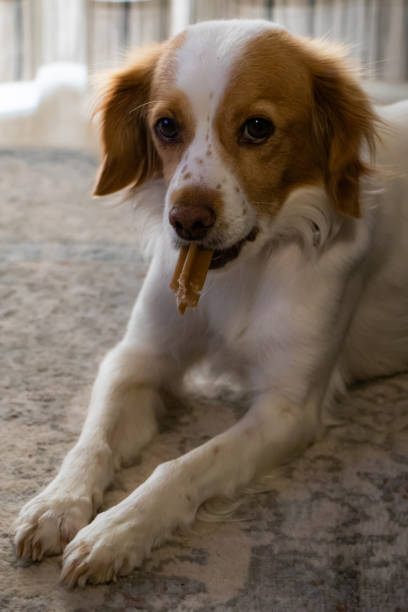
By: Georgina – Owner of Norbert’s Treats
Published: June 2025 | Last Updated: June 2025
In our humble opinion, yes Dentastix are bad for dogs. Dogs have no nutritional requirement for carbohydrates and these contain over 90% pure carbs. Carbohydrates contain sugar, which can make an already energetic dog hyperactive and this negatively disrupts behaviour.
Pedigree dentastix are a familiar sight in UK pet aisles, marketed as vet-approved dental chews that reduce tartar by up to 80%. But are they truly beneficial for your dog’s health, or is there more beneath the surface?

Dentastix contain Sodium Tripolyphosphate (STPP), a chemical agent that helps break down plaque and tartar. However, STPP comprises only about 2.6% of each stick. The remaining 97.4% includes cereals, starches, and flavourings, which may not contribute significantly to dental health.
While the X-shaped design and abrasive texture aim to clean teeth, some dogs consume these chews quickly, reducing their effectiveness and increasing the risk of a blockage.
Several ingredients in Dentastix have raised health concerns:
Used as a red colouring agent, it’s a known skin and eye irritant and has been linked to lung inflammation.
A preservative that can cause skin, eye, and respiratory tract irritation in dogs.
Derived from animal digest, this flavouring lacks real meat content and may not provide nutritional benefits.
High in carbohydrates, these can be difficult for some dogs to digest and may contribute to weight gain.
While many dogs consume Dentastix without immediate issues, some pet owners have reported adverse reactions, including digestive upset.
Veterinary professionals have expressed concerns about the efficacy of Dentastix. Some suggest that brushing your dog’s teeth is more effective for maintaining oral health, as dogs may consume chews too quickly for them to have a significant cleaning effect.
Natural dog treats contain whole, recognizable ingredients (e.g., chicken, sweet potato, duck, turkey or beef). Many of our chews contain one single ingredient which is the best a dog can get! Natural treats are often grain and gluten free, not to mention hypoallergenic too. They include real, recognisable ingredients such as meat, fruit and vegetables, leaving out ingredients that are hard to pronounce.
If you’re seeking safer options for your dog’s dental health, consider:
Natural Chews: Items like pizzles, pigs ears, chicken feet, rabbit ears, ostrich bones or specially formulated dental chews with natural ingredients can help clean teeth.
Regular Brushing: Brushing your dog’s teeth with canine-specific toothpaste remains one of the most effective methods for preventing dental issues.
Carbohydrates: The high carbohydrate content of many commercial pet food brands contributes to a more acidic ph in your dogs mouth, which can speed up the development of dental plaque and tartar.
Pizzles (bully sticks) are high in protein, long-lasting and a very satisfying chew for dogs. Even the picky ones! Our pizzles are available in two sizes and are suitable for most dogs. They are meaty, high in protein and low in fat. What’s more, we now only stock British pizzles. Our chief taste testers told us these are the tastiest pizzles ever and they are local too. Win win!
Pig’s ears are a superb occasional chew for dogs. When they chew on pig’s ears, it helps to remove plaque from their teeth and massage their gums. This mimics the natural cleaning action that would occur if dogs were eating raw bones. Some pig’s ears also contain small amounts of glucosamine and chondroitin, two naturally occurring compounds that are known to support joint health, especially in older or larger breeds prone to stiffness or arthritis.
Chicken feet are naturally rich in glucosamine and chondroitin, compounds known to support joint health. These nutrients help maintain cartilage, reduce inflammation, and improve mobility, especially beneficial for older dogs or breeds prone to joint issues like arthritis. Each chicken foot contains approximately 450 mg of glucosamine, making them a cost-effective alternative to watered-down canine supplements.
Rabbit ears: the munchy, scrunchy, chewable kind (and not an item from your cute pooch’s dressing-up box) are a highly nutritious, protein-rich treat for dogs of all shapes, sizes and ages. Rabbit ear protein helps to maintain healthy muscles, hair, and skin and supports other bodily functions, keeping your dog in tip-top condition.
Ostrich bones are safe for dogs to consume due to their unique structure and composition. Unlike other animal bones that are hard and dense, ostrich bones are lightweight, porous, and have air pockets, making them less likely to splinter and cause harm to a dog’s digestive system.
Ostrich bones also contain a significant amount of nutrients that can benefit dogs, such as calcium, phosphorus, and protein. These nutrients are essential for strong bones, teeth, and muscles, and can help support a dog’s overall health and wellbeing. Additionally, chewing on ostrich bones can help promote dental health by reducing plaque and tartar buildup and keeping a dog’s teeth clean and healthy. Overall, ostrich bones are a great option for dogs to safely enjoy and reap the benefits of a nutritious and stimulating chew.
Whilst dentastix can be a convenient treat for dogs, they do contain calories and high levels of carbohydrates which should be deducted from your dog’s overall food intake. If you have a small dog, we advise feeding a smaller amount or none at all, especially if you give your dog treats as well as their own food.
Occasional dentastix are not going to cause too many problems but they do very little to clean teeth. We recommend feeding these in moderation or finding a more natural, guilt-free alternative.
Natural veggie chews are designed to be chewed thoroughly and consumed by your dog. These are also low in fat and small enough to be given daily. Likewise bully sticks or pizzles are a superior, long-lasting and effective dental chew recommended by vets.
Dentastix are not high in fat, which might make you think they are good for dogs. Sadly, they are not high in meat content either. The meat and animal derivatives are not specifically described on the label – these could contain any slaughterhouse waste products including animal parts that have been on the floor. The composition of these derivatives do not have to be specified on the label and are therefore best avoided all together.
While dentastix are convenient and have been around for years, there are many better and far healthier alternatives out there for your dog. We believe it is best to choose single ingredient treats that have a high meat content. Dogs are ultimately carnivores and meat should make up the majority of their diet. A growing number of UK dog guardians place a great deal of importance on the type of food they feed their dog. Therefore, when it comes to treats for your beloved dog, feeding them naturally really is best for their health.